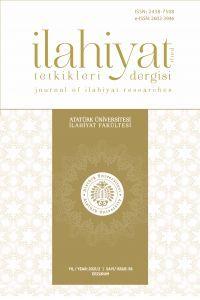Hadis-Rey Tartışmasının Hüküm Tespitine Etkisi: Hükmün Kaynağı Probleminin Kelamla İlişkisi Bağlamında Bir Değerlendirme
The Effect of Ḥadīth-Ra’y Discussion on Judgment Determination: An Evaluation in the context of the Relation between the Source of Judgment Problem and Kalam
Author(s): Elmas Gülhan GençdoğanSubject(s): History of Islam, Contemporary Islamic Thought, Sociology of Religion, Qur’anic studies
Published by: Atatürk Üniversitesi İlahiyat Fakültesi
Keywords: Kalam; Fiqh Method; Judgment; Ḥadīth-Ra’y; Divine Will;
Summary/Abstract: The differences that emerged in the fiqh method regarding the definition of the judgment have a kalām-based ground. ʿAlāʾ al-Dīn al-Samarqandī talks about the theological ground of the theory of judgment and expresses the effect of theological divergences on the differences regarding the nature of the judgment. As a reaction to the Mu'tazila's understanding of good-evil/husn-kubh, that the judgments of actions can be known even before the shari’a comes, the Ash'arites claim that the mind cannot judge the goodness or badness of an action, that the mind does not require gratitude to the one who gives blessings, and that actions do not have any judgment before the bad thing comes. Also, in the basis of the problem of ḥadīth-ra’y lies of the differences of opinion that emerged in the theory of judgment. It is obvious that the Qur'an and the sunnah are the two most important sources. However, it is also known that the collection of hadiths causes a narrowing of the field of judgment with reason. Since they are the source of the ḥadīth-ra’y discussions, the authority of the Qur'an and the Sunnah is mentioned here. Here again, it should be emphasized that the authority of the Qur'an and Sunnah is provided by the kalam. The determination of the Divine will as the only authorized element in making judgments has also been determined by the kalam.
Journal: İlahiyat Tetkikleri Dergisi
- Issue Year: 2021
- Issue No: 56
- Page Range: 119-142
- Page Count: 24
- Language: Turkish

